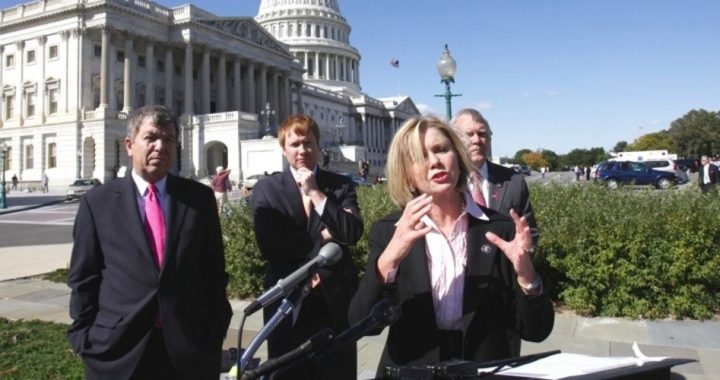
The Department of Health and Human Services (HHS) has adopted a “too-big-to-control” model that is wasting billions of taxpayer dollars, House Republicans indicated Wednesday during a hearing on the agency’s lavish spending habits. Republican members of the Energy and Commerce Committee’s oversight subcommittee railed against the HHS’ exorbitant spending, specifically on issues such as international travel, its skyrocketing payroll costs, and the agency’s refusal to terminate wasteful and ineffective programs.
“It does appear that HHS is now too big to control,” charged Rep. Marsha Blackburn (R-Tenn., pictured above left). “It is very evident to us that you are too big to manage. You are too unwieldy. … You are spending money in ways that you ought not to be spending it.”
Norris Cochran, Deputy Assistant Secretary of Budget for the HHS, countered Blackburn and her colleagues, saying the agency’s staff has grown significantly in recent years to help support the Indian Health Service and the Food and Drug Administration. However, Cochran neglected to mention the HHS’ new agency, the Center for Consumer Information and Insurance Oversight (CCIIO), which was established to govern President Obama’s contentious healthcare reform law.
The CCIIO has demanded a slew of resources to carry out its mission, which is to provide “national leadership in setting and enforcing standards for health insurance that promote fair and reasonable practices to ensure that affordable, quality health coverage is available to all Americans.” In effect, the HHS’ new arm was founded as an oversight group to regulate insurance providers and enforce strict new rules on the health insurance market.
During the two-hour hearing, House Republicans targeted the HHS on an array of issues, two items in particular being its rising salaries and exorbitant travel expenses. Panel chairman Rep. Cliff Stearns (R-Fla.), for example, noted that 90 of the 100 highest-paid federal workers are on the HHS payroll.
Rep. Joe Barton (R-Texas) suggested that international travel expenses — which hovered around $65 million in 2011 — could be curtailed by inviting foreign leaders to the U.S. “on their dime.” Mr. Barton also exploited a pair of taxpayer-subsidized scandals that recently transpired under the Obama administration, particularly the General Services Administration’s (GSA) lavish $800,000 Las Vegas conference that resulted in the firings of numerous GSA employees.
“We’ve all seen the reports in the last several months about some of these abuses of public funds — the GSA, their trips to Las Vegas, the Secret Service and their escapades down in South America,” Barton affirmed. “We all hope those are exceptions and not the rule. But I look at HHS, and… it’s an agency that’s almost uncontrollable.”
While Democrats on the committee touted ObamaCare’s alleged benefits, Republicans fired back, asking why the HHS rejected a recommendation by the Government Accountability Office (GAO) to terminate a Medicare Advantage quality bonus program that federal auditors said was unlikely to generate “meaningful results.”
Even more incredulously, Mr. Cochran deflected questions from Rep. Michael Burgess (R-Texas), who asked if there was a contingency plan in place for the possibility of ObamaCare being overturned in the Supreme Court. “The focus is on implementing the law,” he responded.
Burgess was astounded. “Your authority to pay providers under Medicare and Medicaid may evaporate on July 1, according to some AP reports,” he noted. “You’ve got to have some contingency. … This is the equivalent of taking the Fifth on this issue.”
Of course, the cost of implementing ObamaCare, in itself, has boosted far beyond its original projections. Backtracking to his September 2009 remarks on the law, the President relayed to Congress ObamaCare’s “true” ten-year cost: “Now, add it all up, and the plan I’m proposing will cost around $900 billion over 10 years — less than we have spent on the Iraq and Afghanistan wars, and less than the tax cuts for the wealthiest few Americans that Congress passed at the beginning of the previous administration.”
However, a recent report issued by the Congressional Budget Office (CBO) found that ObamaCare’s actual cost would be $1.76 trillion over a decade, leaving the President about $820 billion short of his 2009 projection. Many analysts questioned the original estimates, but the administration and congressional Democrats seemingly obscured ObamaCare’s true cost just to push the legislation through Congress. As Philip Klein of the Washington Examiner averred , “Democrats employed many accounting tricks when they were pushing through the national health care legislation, the most egregious of which was to delay full implementation of the law until 2014.”
Indeed, ObamaCare’s exorbitant price tag, combined with the HHS’ refusal to address its reckless spending habits, is only adding to the nation’s skyrocketing deficit. And as the Republicans indicated on Wednesday, the bigger these federal agencies grow, the more difficult they become to control.
Photo: Rep. Marsha Blackburn (R-Tenn.) second from right, spoke during a health care news conference on Capitol Hill in Washington, back on Oct. 7, 2009: AP Images



